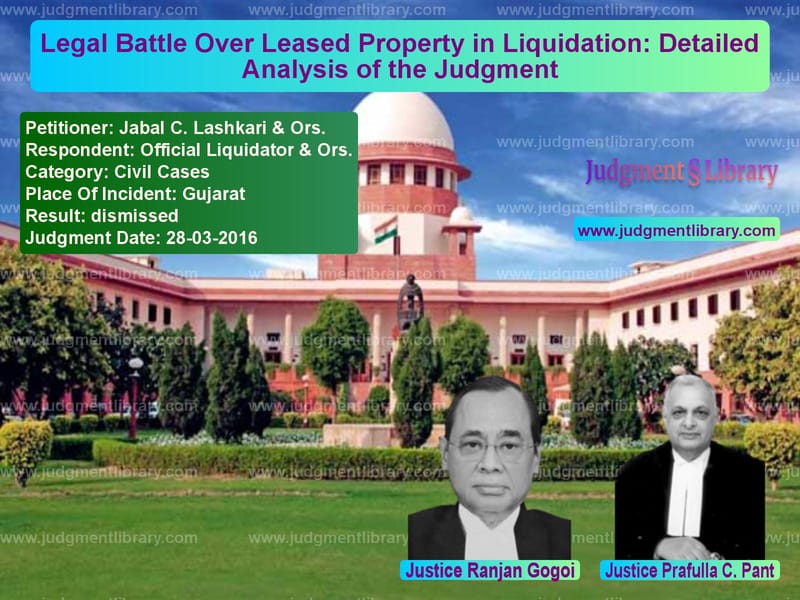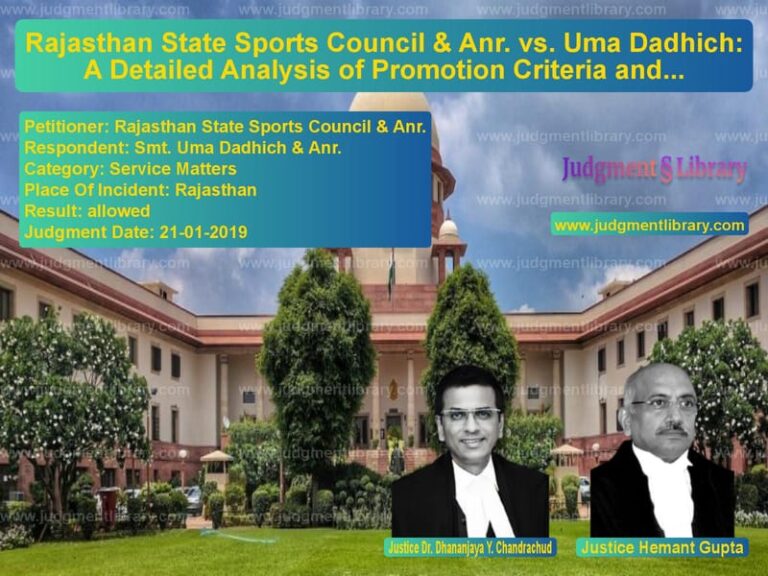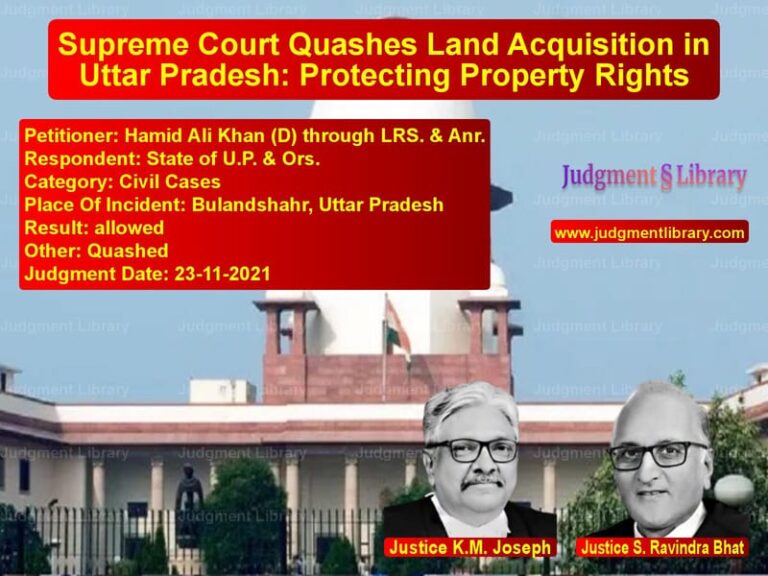Legal Battle Over Leased Property in Liquidation: Detailed Analysis of the Judgment
The Supreme Court of India recently ruled on a crucial case involving a long-standing dispute over leased property following the liquidation of Prasad Mills Ltd. The appellants, heirs of the original lessor, sought repossession of the leased land on multiple grounds, including default in rent payment and non-utilization of the property by the company in liquidation.
In this in-depth examination of the judgment, we explore the arguments put forth by both sides, the legal provisions governing the dispute, and the reasoning behind the Supreme Court’s decision.
Background of the Case
The dispute revolves around a lease agreement dated December 10, 1916, in which the predecessors of the appellants leased a land parcel measuring 35,772 square meters to Prasad Mills Ltd. for a period of 199 years. Prasad Mills Ltd. later faced financial difficulties, leading to winding-up proceedings initiated in 1984. The Gujarat High Court appointed an official liquidator, who took charge of the company’s assets.
Subsequently, the legal heirs of the original lessor filed applications seeking the return of the leased property, arguing that the company in liquidation had defaulted on rent payments for over 15 years and had ceased using the property for its intended purpose.
Arguments Presented by the Appellants
The appellants raised several key contentions before the Supreme Court:
- The company had defaulted on rent payments for over 15 years, making it liable for eviction under Section 12 of the Bombay Rent Act.
- The property had remained unused for more than six years, violating Section 13(1)(k) of the Rent Act.
- The official liquidator lacked the authority to transfer or alienate the leased property in violation of the provisions of the lease agreement.
- The lease agreement did not grant the right to sublease or assign the property, making the official liquidator’s actions unlawful.
Arguments by the Respondents
The official liquidator, representing Prasad Mills Ltd., countered these claims with the following arguments:
- The secured creditors, including State Bank of India, were willing to clear all outstanding rent payments, which negated any grounds for eviction under Section 12.
- The non-usage of the property was a direct result of the winding-up order and was not an intentional act warranting eviction.
- The terms of the lease allowed sub-leasing, and no unlawful assignment had been carried out.
- The continuation of the liquidation process meant that the corporate existence of the company was still intact, and the lease remained valid.
Supreme Court’s Observations and Decision
The Supreme Court carefully examined the lease agreement, the provisions of the Bombay Rent Act, and the arguments presented by both parties. The court made the following observations:
- Section 12 of the Rent Act, which protects tenants from eviction due to non-payment of rent, requires that the landlord issue a notice demanding rent before initiating eviction proceedings. Since no such notice had been issued, the appellants’ claim under this provision was rejected.
- Regarding Section 13(1)(k), the court held that the winding-up proceedings of the company constituted a valid reason for non-usage, thus negating the eviction claim on this ground.
- The lease agreement contained provisions allowing sub-leasing, which meant that the official liquidator was not in violation of the lease terms.
- Given that the liquidation proceedings were ongoing and the revival of Prasad Mills Ltd. was still under consideration, the official liquidator could not be compelled to surrender the leased property.
Based on these findings, the Supreme Court upheld the Gujarat High Court’s decision and dismissed the appeals filed by the appellants.
Implications of the Judgment
This ruling has far-reaching implications for landlords and tenants involved in long-term lease agreements, particularly in cases where companies undergo liquidation. The key takeaways from this judgment include:
- Landlords must issue a formal notice before seeking eviction for non-payment of rent.
- Non-usage of leased property due to liquidation does not automatically warrant eviction.
- Lease agreements must be carefully scrutinized before raising claims of unlawful sub-leasing or assignment.
- Ongoing liquidation proceedings do not terminate a company’s legal status, and official liquidators retain control over leased assets.
This case underscores the importance of legal due diligence in lease agreements and highlights the complexities involved in landlord-tenant disputes arising from corporate insolvency.
Don’t miss out on the full details! Download the complete judgment in PDF format below and gain valuable insights instantly!
Download Judgment: Jabal C. Lashkari & vs Official Liquidator Supreme Court of India Judgment Dated 28-03-2016-1741853989146.pdf
Direct Downlaod Judgment: Direct downlaod this Judgment
See all petitions in Property Disputes
See all petitions in Contract Disputes
See all petitions in Judgment by Ranjan Gogoi
See all petitions in Judgment by Prafulla C. Pant
See all petitions in dismissed
See all petitions in supreme court of India judgments March 2016
See all petitions in 2016 judgments
See all posts in Civil Cases Category
See all allowed petitions in Civil Cases Category
See all Dismissed petitions in Civil Cases Category
See all partially allowed petitions in Civil Cases Category







